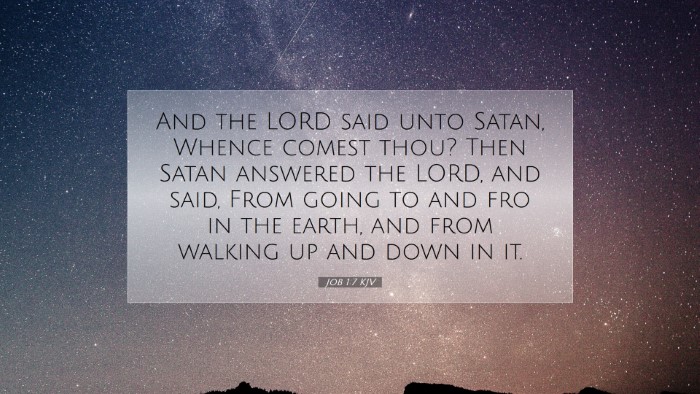Old Testament
Genesis Exodus Leviticus Numbers Deuteronomy Joshua Judges Ruth 1 Samuel 2 Samuel 1 Kings 2 Kings 1 Chronicles 2 Chronicles Ezra Nehemiah Esther Job Psalms Proverbs Ecclesiastes Song of Solomon Isaiah Jeremiah Lamentations Ezekiel Daniel Hosea Joel Amos Obadiah Jonah Micah Nahum Habakkuk Zephaniah Haggai Zechariah MalachiJob 1:7
Job 1:7 KJV
And the LORD said unto Satan, Whence comest thou? Then Satan answered the LORD, and said, From going to and fro in the earth, and from walking up and down in it.
Job 1:7 Bible Commentary
Commentary on Job 1:7
Verse: "And the LORD said unto Satan, Whence comest thou? Then Satan answered the LORD, and said, From going to and fro in the earth, and from walking up and down in it." (Job 1:7)
Introduction
This verse marks a significant moment at the beginning of the Book of Job, setting the stage for the profound dialogues about suffering, righteousness, and divine sovereignty. The dialogue between God and Satan introduces the thematic exploration of why the righteous suffer and the nature of faith amidst trials. This commentary will draw from several public domain sources, employing insights from Matthew Henry, Albert Barnes, and Adam Clarke to unravel the layers of meaning in this verse.
Contextual Analysis
Setting: Job is introduced as a righteous man, blameless and upright, who fears God and turns away from evil (Job 1:1). This verse transitions the narrative into a heavenly court scene, where the characters of God and Satan engage in a critical conversation regarding Job.
The Significance of God's Question: "Whence comest thou?" raises questions about the nature and role of Satan. The inquiry emphasizes God’s sovereignty over all creation, including the forces of evil. It’s an invitation for Satan to disclose his intentions, laying bare the motives behind his actions.
Insights from Commentaries
-
Matthew Henry:
Henry emphasizes the providential oversight God maintains over creation. He notes that Satan’s roaming signifies the active presence of evil in the world. Yet, God's question affirms that He governs the narrative, demonstrating that while evil may appear to have power, it is ultimately under divine authority.
Furthermore, he comments on the import of Satan's response, which reveals his intent to destroy and undermine human piety. Henry suggests this reflects the broader theme of spiritual warfare and the need for vigilance among believers.
-
Albert Barnes:
Barnes reflects on the details of Satan's claim, noting the dual aspects of his roaming: both to seek opportunities to harm and to fulfill his part in the larger cosmic struggle. He argues that Satan's admission to the Lord about his movements insinuates an unsettling truth about the presence of evil in the world.
He connects this passage with the New Testament, particularly in 1 Peter 5:8, where the enemy is described as a roaring lion seeking whom he may devour, underscoring the continuous threat that believers face.
-
Adam Clarke:
Clarke engages with the philosophical implications of this dialogue, interpreting it as a demonstration of free will and the testing of faith. He posits that God permits Satan to challenge Job’s integrity in order to showcase the deeper truth of loyalty to God.
He further elaborates that the phrase “going to and fro” symbolizes active searching for those to tempt or ruin, underscoring a relentless pursuit that believers must recognize and respond to spiritually.
Theological Implications
The interaction between God and Satan not only establishes the context for Job's trials but also introduces profound theological questions surrounding the nature of suffering, divine justice, and human righteousness.
-
The Sovereignty of God:
This passage illustrates God's ultimate authority even in the presence of evil. Rather than being passive, God actively engages with Satan, suggesting that all events unfold within the sovereignty of divine providence.
-
The Nature of Evil:
The verse highlights the reality of evil's existence and its role in the world. Satan, as the accuser, serves a purpose in God's grand design, pressing the narrative that challenges believers' faith.
-
Human Suffering:
The ensuing trials of Job prompt an exploration of why the righteous suffer. This can lead believers to contemplate the idea that suffering is not always indicative of divine displeasure, but can serve greater purposes in spiritual growth and testimony.
Practical Applications
For pastors, theologians, and students, this passage offers several practical takeaways:
-
Encouragement in Trials:
Understanding the dynamic of suffering provides a framework for supporting congregants going through difficulties, encouraging them to trust in God’s sovereignty and presence even in their trials.
-
Awareness of Spiritual Warfare:
The passage serves as a reminder of the ongoing spiritual warfare believers face, urging them to be vigilant and grounded in their faith as they navigate life’s uncertainties.
-
God’s Purpose in Suffering:
Highlighting that suffering can lead to spiritual maturity and a deeper understanding of God's character encourages believers to seek purpose in their pain, leading to a more profound relationship with God.
Conclusion
Job 1:7 encapsulates a moment that opens a discussion on profound theological concepts regarding the interplay of divine sovereignty, the reality of evil, and human faith amidst hardship. Commentary insights enrich our understanding of this narrative, urging reflection on God's authority over all creation and the necessity of remaining steadfast amidst trials. As believers engage with this text, they are reminded of the vital importance of being grounded in faith, especially when confronted with the challenges and mysteries of life.


